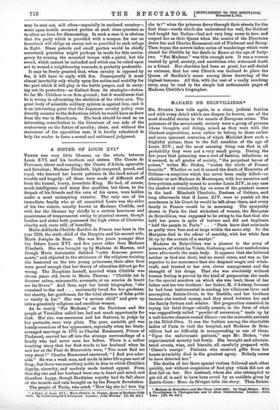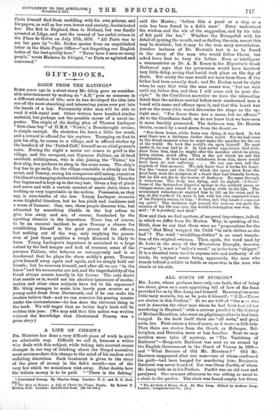MADAME DE BRINVILLIERS.*
MB. STOKES here tells again, in a clear, judicial fashion and with every detail which can deepen its horror, one of the most dreadful stories in the annals of European crime. The poisoners of the seventeenth century were a group of persons whose thoughts and doing; mixed as they were with the blackest superstition, seem rather to belong to those earlier and more ignorant centuries, of which Micbelet drew such a frightful picture, than to the full sunshine of the age of Louis XIV.; and the most amazing thing was that in all probability they were not a very small group. During the few years that poisoning was a sort of fashion, infectious, as it seemed, in all grades of society, " the perpetual terror of poison," writes Mr. Stokes, "makes the whole of France tremble." Whether or not it caused the death of Henrietta of Orleans—a suspicion which has never been really killed—or whether or not Madame de Montespan, with her sorceries and love-potions, actually meant to murder Louis XIV., in any case the shadow of criminality lay on some of the greatest names in the land. Elisabeth Charlotte, Duchess of Orleans, said long afterwards that if Louis XIV. were to punish all the murderers in his Court he would be left alone there, and every family in Prance would be in mourning. The sympathy shown in Paris for that wickedest of women, the Marquise de Brinvilliers, was supposed to be owing to the fact that she held her peace in spite of torture and did not implicate " half the people in Paris." . . . "Paris knew that criminals as guilty were free and at large within the same city. So the Marquise died in the odour of sanctity, with her white face lit up by the aureole of a martyr."
Madame de Brinvilliers was a pioneer in the army of poisoners, of which La Voisin, Guibourg, and their confederates were afterwards the main body. It appears that she believed neither in God nor devil, had no moral sense, and was so far superior to her successors that she despised magic and witch- craft, and trusted to her own clever management and the strength of her drugs. That she was absolutely without human feeling is proved by the kind of preparation she made for the special murders on which she was bent, those of her father and her two brothers : her father, M. d'Aubray, because he had been instrumental in sending her villainous lover and accomplice, Sainte-Croix, to the Bastille, and her brothers because she wanted money, and they stood between her and the family fortune and estates. Her preparation consisted in trying her fatal drugs—chiefly arsenic, in the form of what was suggestively called " powder of succession," made up by a well-known chemist named Glaser—on the miserable patients in the Hotel-Dieu. It was the fashion among the charitable ladies of Paris to visit the hospital, and Madame de Brin- villiers had no difficulty in masquerading as one of them. "Upon the unfortunate patients," says Mr. Stokes, "she experimented secretly but freely. She brought and adminis- tered sweets, wine, and biscuits, all carefully prepared with ' Glaser's receipt.' Patients who received gifts from her hands invariably died in the greatest agony. Nobody seems to have detected her."
The deaths of her three special victims followed each other quickly, not without suspicions of foul play which did not at first fall on her. Her husband, whom she also attempted to get rid of, is said to have been saved by an antidote given by Sainte-Croix : Mme. de Sevigne tells the story. Then Sainte-
• Madams de Brinvilliers and Her Tana (1630-1676). By Hugh Stokes. With a Frontispiece in Photogravure and 15 other Illuatrations. London : John Lane. [12A. 65. net.]
Croix himself died from meddling with his own poisons, and his papers, as well as her own terror and anxiety, incriminated her. She fled to England, then to Holland, but was finally arrested at Liege, and met the reward of her awful crimes in the Place de Greve on July 17th, 1676. " All Paris was to see her pass by "-Mr. Stokes quotes from an unpublished letter in the State Paper Office—"not forgetting our English ladies of the best quality here." " Never have I seen so many people," wrote Madame de Sevigne, "or Paris so agitated and concerned."







































































 Previous page
Previous page